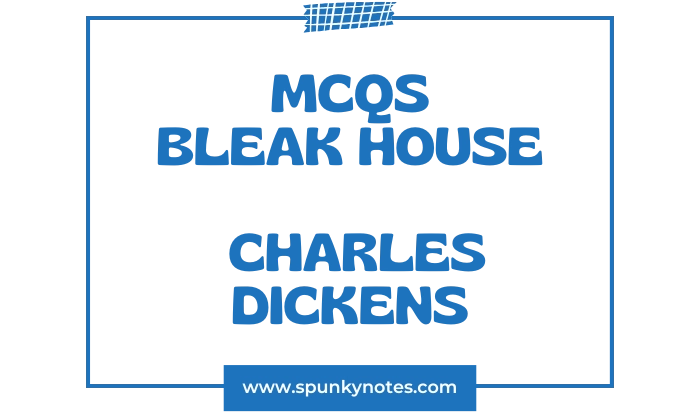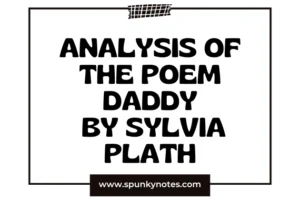

Estimated Reading Time: 18 min
Bleak House MCQs
1. The weather described in Chapter 1 during Michaelmas Term is what kind of weather?
A. Sunny and clear
B. Implacable November weather
C. Cold and dry
D. Spring-like
2. What large creature might one expect to meet waddling up Holborn Hill due to the weather?
A. An elephant
B. A Mastodon
C. A Megalosaurus
D. A Hippopotamus
3. The High Court of Chancery is referred to as “most pestilent of hoary sinners” holding what kind of condition?
A. Wealthy and grand
B. Groping and floundering
C. Just and fair
D. Decaying and empty
4. What warning do honorable practitioners give regarding coming to the Court of Chancery?
A. Hire the best counsel
B. Suffer any wrong rather than come here
C. Be patient
D. Bring copious documents
5. What is the name of the endless cause currently “in hand” in Chancery?
A. Dedlock v. Boythorn
B. Krook v. Nemo
C. The Great Seal Case
D. Jarndyce and Jarndyce
6. Who is always present in court, expecting an incomprehensible judgment?
A. A sallow prisoner
B. The man from Shorpshire
C. A little mad old woman in a squeezed bonnet
D. Miss Barbary
7. What happened to old Tom Jarndyce in despair over the suit?
A. He died of sickness
B. He blew his brains out at a coffee-house in Chancery Lane
C. He ran away
D. He went into bankruptcy
8. When the Chancellor says he will see “both the young people,” what two people are referred to?
A. Richard Carstone and Ada Clare
B. Esther Summerson and Ada Clare
C. Richard Carstone and Esther Summerson
D. Mr Tangle’s friends
9. Mr Tulkinghorn’s dress expresses him as the steward of legal mysteries or the butler of what?
A. The legal cellar
B. Chesney Wold
C. The Dedlock fortunes
D. The court
10. Sir Leicester Dedlock regards the Court of Chancery as something devised by the perfection of human wisdom for what purpose?
A. The eternal settlement of every thing
B. His personal status
C. The continuation of the Dedlock name
D. Avoiding Wat Tyler
11. What interrupts Mr Tulkinghorn’s reading of the court document?
A. Lady Dedlock’s request to skip formalities
B. Sir Leicester dosing
C. Lady Dedlock’s swoon
D. Lady Dedlock asking who copied the papers
12. What is the estimated aggregate amount of costs in Jarndyce and Jarndyce?
A. From twenty to thirty thousand pounds
B. From sixty to seventy thousand pounds
C. Over one hundred thousand pounds
D. Five thousand pounds
13. From whom does the receiver in the cause acquire distrust and contempt?
A. His own kind and his own mother
B. The solicitors
C. The suitors
D. The court
14. Who is the mild bald gentleman in spectacles who drops into dinner at Mrs Jellyby’s house?
A. Mr Quale
B. Mr Kenge
C. Mr Jellyby
D. Richard Carstone
15. Caddy Jellyby suddenly say she wished was dead?
A. Borrioboola-Gha
B. Africa
C. Her mother
D. Philanthropy
16. What kind of shop had legal inscriptions written in law-hand among the prices for rags and bottles?
A. Mr Snagsby’s
B. Mr Krook’s
C. Coavinses
D. Mr Tulkinghorn’s
17. What was written on the inscription advertising a respectable man wanting engrossing or copying work?
A. Address to Mr Snagsby
B. Address to Nemo, care of Mr Krook within
C. Law Books, all at 9d
D. Marine Stores
18. What is the name of the old lady who keeps birds in the garret?
A. Mrs Snagsby
B. Miss Flite
C. Mrs Jellyby
D. Miss Barbary
19. What word does Richard say is “a weary word”?
A. London
B. Adventure
C. Chancery
D. Costs
20. What is the name of Mr Skimpole’s steward, according to his philosophy?
A. Ada
B. Richard
C. Jarndyce
D. The World
21. What is the name of the man who comes to arrest Mr Skimpole?
A. Mr Tulkinghorn
B. Mr Tangle
C. Coavinses
D. Mr Kenge
22. Who is mentioned as a mother who had two sons, one who ran wild and one who constructed steam-engines?
A. Mrs Jellyby
B. Mrs Snagsby
C. Mrs Rouncewell
D. Mrs Bagnet
23. Sir Leicester Dedlock sees Mrs Rouncewell’s second son (the ironmaster) as one of a body of conspirators who do what?
A. Turn out by torchlight, for unlawful purposes
B. Practice law
C. Seek election to Parliament
D. Engage in philanthropy
24. The housekeeper says the family greatness of the Dedlocks consists in their never having done anything to distinguish themselves for how long?
A. Since the Conquest
B. For seven hundred years
C. In modern times
D. For a century
25. What did the man on the floor, whom Mrs Pardiggle visited, accuse his wife of when asked about her black eye?
A. Giving it to herself
B. Having been in a brawl
C. Being a Lie if she denied he gave it her
D. Falling down
26. What phrase does Jo sum up his mental condition with?
A. That he ‘don’t know nothink’
B. That he is unfortunate
C. That he is wicked
D. That he is homeless
27. Mr Boythorn says he would have bought what animal to loose upon the first encroaching robber?
A. A dog
B. A lion
C. A wolf
D. A bull-dog
28. What is the name of the couple who are the expected guests at Mr Snagsby’s house?
A. Mr and Mrs Guppy
B. Mr and Mrs Tangle
C. Mr and Mrs Chadband
D. Mr and Mrs Bogsby
29. What is the main product resulting from Mr Chadband’s heavy consumption of food and drink?
A. Verbose speech
B. A feeling of contentment
C. Oil of a certain quality
D. Spiritual profit
30. Who cross-examines Jo regarding the sovereign he received from the veiled lady?
A. Mr Snagsby
B. Mr Chadband
C. Mr Guppy
D. The constable
31. What is the name of the detective officer Mr Tulkinghorn introduces to Mr Snagsby?
A. Mr Snagsby
B. Mr Mooney
C. Mr Tangle
D. Mr Bucket
32. What affliction did Caddy Jellyby’s daughter ultimately suffer from?
A. Blindness
B. Inky fingers
C. Deaf and dúmb
D. Fits
33. The law-writer Nemo died from too much of what substance?
A. Alcohol
B. Opium
C. Poison
D. Cholera
34. Mr Snagsby compares Krook’s burning body to what phenomenon, though the idea disconcerts him?
A. An explosion
B. Spontaneous combustion
C. A dreadful mystery
D. A dreadful accident
35. What does Tony Weevle/Jobling confess about Krook’s reading ability?
A. He is too old and too drunk to acquire the knack of reading
B. He reads very well
C. He reads only law books
D. He only reads by night
36. What were the papers Mr Guppy intended to bring to Lady Dedlock?
A. Old letters
B. New affidavits
C. Warrants
D. Bills of mortality
37. Mr Vholes insists he cannot be selfish because he must maintain his daughters and what other relative?
A. A dear grandmother
B. An aged father in the Vale of Taunton
C. His wife
D. His cousin
38. Mr George describes Mr Tulkinghorn as what kind of man?
A. A confoundedly bad kind of man, slow-torturing
B. A fine old soldier
C. A legal genius
D. A man of great generosity
39. What two words were written on the anonymous letters received by Mr Bucket?
A. Tulkinghorn murdered
B. Lady Dedlock
C. George Rousewell
D. Find her
40. What specific words were written on the letter directed to Sir Leicester, intercepted by Mr Bucket?
A. Lady Dedlock
B. Lady Dedlock, murderess
C. Guilty
D. Forgiveness
41. How did Mr Bucket say he originally acquired the information leading to Jo/Toughey?
A. By following Kenge and Carboy
B. By throwing a morsel of gravel at Harold Skimpole’s window
C. By listening to Mr Jarndyce
D. By questioning the beadle
42. Who does Mr Bucket say was Krook’s own brother?
A. Mr Tulkinghorn
B. Captain Hawdon
C. A brimstone magpie (Mrs Smallweed)
D. Mr George
43. Why does Sir Leicester keep Volumnia at his bedside?
A. To entertain him
B. To read to him
C. To prevent her talking somewhere else
D. To comfort him
44. What did the man on the floor, whom Mrs Pardiggle visited, accuse his wife of when asked about her black eye?
A. Giving it to herself
B. Having been in a brawl
C. Being a Lie if she denied he gave it her
D. Falling down
45. What is the name of the woman who raised Esther Summerson?
A. Mrs. Jellyby
B. Mrs. Rouncewell
C. Miss Flite
D. Miss Barbary
46. What secret does Miss Barbary reveal to Esther on her deathbed?
A. That Esther is her mother
B. That Esther’s mother was her sister
C. That Esther’s mother was a disgrace
D. That Esther has a twin sister
47. What object does Esther find at Krook’s shop that matches the handwriting in the Jarndyce papers?
A. A letter
B. A will
C. A small placard with “Nemo” on it
D. A diary
48. What illness does Esther contract from Jo the crossing-sweeper?
A. Tuberculosis
B. Smallpox
C. Cholera
D. Influenza
49. Who is finally revealed to be Esther’s mother?
A. Miss Flite
B. Mrs. Rouncewell
C. Mademoiselle Hortense
D. Lady Dedlock
50. What is the final outcome of the Jarndyce and Jarndyce lawsuit?
A. Richard and Ada win the entire estate.
B. The estate is divided equally among all suitors.
C. Legal costs consume the entire estate.
D. Sir Leicester Dedlock inherits everything.
Brief Overview
Bleak House is one of Charles Dickens‘ most complex novels. It tells two separate stories that slowly come together.
The first story is about a famous court case called Jarndyce and Jarndyce. The case has been in the slow, broken legal system for many years. It wastes the money and destroys the hopes of everyone involved.
The main characters in this plot are Richard Carstone and Ada Clare. They are related to the case and live with their kind guardian, John Jarndyce.
The second story is a mystery told by Esther Summerson. She is a kind orphan who doesn’t know who her parents are. She moves in to live with John Jarndyce as his companion.
This plot involves the rich and powerful Lady Dedlock. She seems cold and bored but hides a huge secret from her past. A ruthless lawyer, Mr. Tulkinghorn, suspects her secret and tries to expose her.
This leads to blackmail, desperation, and eventually murder. A famous detective, Inspector Bucket, is called in to solve the crime. The novel shows how Esther’s hidden past connects the rich Lady Dedlock to the póor and the failing court case.


